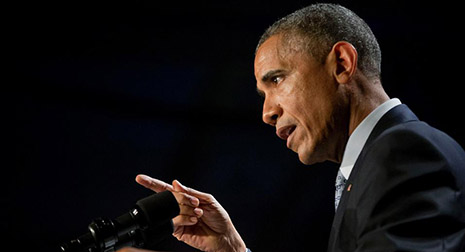“Heaven forbid we’ve got a problem where we could have prevented a terrorist attack or apprehended someone who was engaged in dangerous activity, but we didn’t do so simply because of inaction in the Senate,” Mr. Obama added.
The comments were the most explicit warning to date from the Obama administration about the consequences of allowing the surveillance powers to lapse. Administration officials have been pressing lawmakers for weeks to pass the legislation, called the USA Freedom Act, and in recent days have stepped up their efforts to portray it as a national security imperative.
The measure, passed overwhelmingly by the House this month, would extend the government’s authority to obtain business and other records pertaining to a specific investigative subject, to secure so-called roving wiretaps to track potential terrorists or spies who switch telephones to avoid detection, and to wiretap a terrorism suspect who is not part of a particular group.
But the controversy has centered on the National Security Agency program that collects bulk telephone records, which the bill would eliminate. Instead, under a bipartisan compromise backed by the Obama administration, telephone companies would retain the data, and the N.S.A. could gain access to it by obtaining an order from the secret Foreign Intelligence Surveillance Court.
The president singled out Mr. McConnell on Friday, saying he had conveyed to him and other senators that “I expect them to take action, and take action swiftly.”
Don Stewart, a spokesman for Mr. McConnell, noted that Mr. McConnell had scheduled a rare Sunday session of the Senate “to make every effort to provide the intelligence community with the tools it needs to combat terror.”
For the last week, Senate Republicans have been furiously trying to come up with legislation that can win the support of 60 senators, pass muster in the House — which is reluctant to change the measure it passed — and keep Mr. Paul at bay.
Mr. Obama has kept up pressure on the Senate to pass the legislation by arguing that the surveillance it authorizes is vital to thwarting a terrorist attack, despite a lack of evidence that it has ever done so.
In a statement issued shortly before Mr. Obama spoke, James R. Clapper Jr., the director of national intelligence, said that intelligence professionals “will lose important capabilities” if the authorities expire.
Senior administration officials say that even if the programs cannot be shown to have foiled any attacks, they provide essential “building blocks” on which terrorism investigations are built, akin to grand juries, which are an integral part of criminal cases even if they never themselves stop a crime.
But civil libertarians say the administration’s warnings amount to fear-mongering and efforts to thwart a much-needed overhaul of the government’s surveillance powers.
Lawmakers have spent the week at home hearing from constituents about the matter during their Memorial Day recess.
“I have been having town meetings in Oregon, and lots of Republicans come and say, ‘Good on that effort to cut this bulk phone records program,’ ” said Senator Ron Wyden, Democrat of Oregon, who has been seeking changes to bulk collection for over a decade.
Mr. Wyden said he also continued to object to a short-term solution. “I have made it clear this is the time to end a flawed program,” he said.
More about:
















































